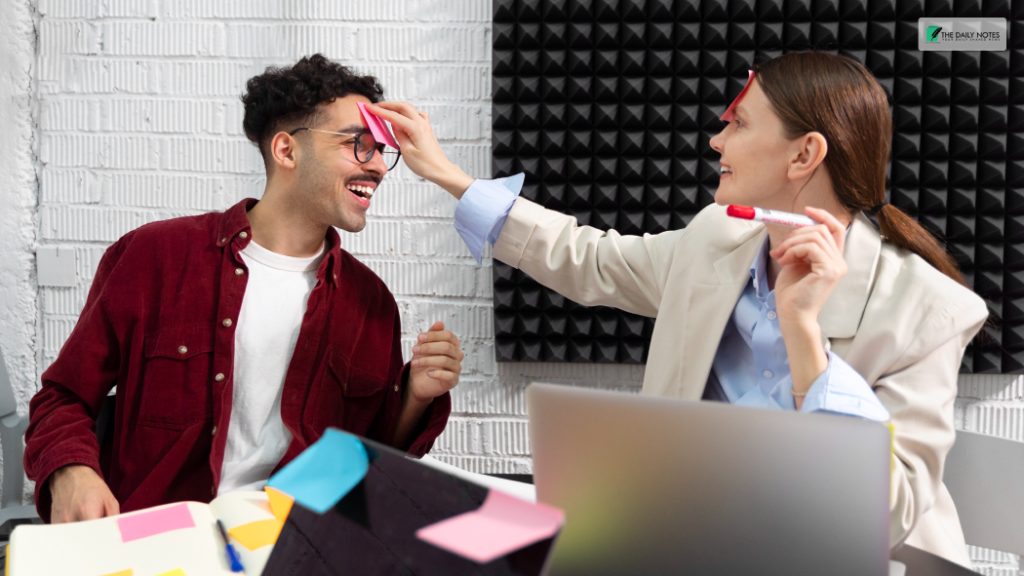On average, nearly 80% of the office distractions are unimportant. Employees get distractions nearly 50-60 times/day.
Distractions are activities, people, or things that take significant time away from employees. These do not allow them to concentrate on their work. The average employee gets interrupted by a million things in their workday – meetings with colleagues dragging them for a coffee break.
There’s seemingly no end to these distractions – you don’t want to be rude to your colleagues, and neither can you say no to meetings that could have been emailed. It’s a lot to deal with! So, how can you be better at handling these distractions?
This article takes you through the different ways to mute the external noise and reach your office Zen. Read on till the end to find out how to make the most of your hours at work!
Importance of Addressing Distractions for Productivity and Workplace Efficiency

An ideal work environment should be distraction-free and allow employees to work efficiently for the maximum hours of the day. Constant distractions do not just make you less productive but also stress you out more than ever!
This also gives people a sense of lack of control over their work. This is also a major contributor to employees feeling dissatisfied with their work. Voluntarily chatting with colleagues about the game last night or the weekend can be controlled. Ad-hoc meetings – not that much.
But why is it important to address distractions? An employee can just go back home and finish the work that’s pending. Or simply stay back a few more hours and leave only after finishing?
That’s not good for the overall well-being of an employee. Yes, exceptions are always there. A day or two of staying back after work hours and finishing up on something is different. Doing it every day is a whole other story.
This qualifies as unfair treatment at work and does not allow employees to have a work-life balance.
Anyone who has worked in an office knows there are workplace distractions that steal time from you. One or two chats near the water dispenser or the coffee machine are understandable.
But when these extend to 15-to-30-minute conversations about nothing that will contribute to work. It is concerning. Not only do you have a distraction at hand, a low motivation to resume work, and a roadblock to your creative energy, but you are also costing the company billions annually.
Thus, you must address distractions at work to enhance productivity and motivation to turn up at work every day!
13 Common Causes of Office Distractions

Here are some common types of office distractions that an employee experiences on a daily:
- Internet browsing
- Cell phones
- Social media
- Conversations with colleagues
- Smoke or snack breaks
- Noisy surroundings
- Emails
- Meetings without/straying away from an agenda
- Messy workplace
- Bad communication
- Multitasking without a deadline
- Visual distractions
- Office romance without boundaries
The list could go on, but these are some of the most common daily distractions an employee experiences. Some of these distractions can be controlled easily. However, the others are out of our control.
For instance, you cannot mute email notifications as it may make you miss out on important information.
You cannot practically expect every day to be as or more productive than the previous one. So, here are some ways to avoid these distractions and have a productive day of your dreams!
Psychological Factors Contributing to Distractions

Contrary to popular belief, distractions aren’t just experienced by people with poor attention or control.
People with mental health issues experience elevated levels of distractions due to the following reasons:
- Emotional Procrastination: Employees can be emotionally drained due to several reasons. From personal life to issues, a lot may be going on in their mind. When emotionally drained, you may procrastinate by piling up the tasks and leaving them for the last minute.
- Mental health issues: Some employees may have mental health issues that prevent them from concentrating on their work. Mental health issues such as depression, ADHD, and anxiety can lead to distraction.
- Lack of motivation: Lack enough motivation due to underlying mental health issues is one of the major reasons why employees are distracted easily. It is not something they can control. Those without a mental health issue may be able to control it, but those with it can hardly do that.
- Cognitive-emotional preoccupation: An interesting psychological factor that contributes to distraction is cognitive-emotional preoccupation. A reduction in the employee’s psychological well-being can lead to preoccupation that does not allow them to concentrate easily.
- Cognitive inhibition abilities: Cognitive inhibition is one of the major factors that allows employees to focus on tasks. When an employee lacks this ability, it can be difficult for them to concentrate. They end up giving priority to everything that seeks their attention.
This can be understood as the inability of employees to fight the desire to play a phone game while they have an important task at hand.
Effects of Office Distractions on Productivity

Distractions in the workplace can have a significant impact on motivation, productivity, and job satisfaction. Some effects on productivity include:
- Lost productivity: Employees lose more than a couple of hours a day due to distractions, which, on average, becomes 25% of a typical 8-hour workday.
- Decreased focus: Distractions in the workplace have a significant impact on the employee. It can break your focus and prevent you from spending enough time on a task.
- Anxiety and stress: Employees can find elevated levels of anxiety and stress due to distractions. It is one of the most overwhelming feelings.
- Burnout: It is one of the other impacts of distractions that is not highlighted enough. Burnout due to distractions is real as it exhausts the employee’s mind. They find it difficult to concentrate on one task while their focus is on other things around them. Be it the ringing phone near them or people talking around them.
- Wasted time: The office distractions you allow yourself to get distracted by are one of the most common ways to waste time.
- Clutter: A disorganized space can be one of the strongest ways distractions affect us. When you are distracted, you do not notice the chaos that slowly surrounds you.
When you reduce distractions, you can always try working on a single task focusing on a single task. You can easily tidy up the workspace or implement a system of organization.
Avoid the 10+ Causes of Distractions at Work with THESE 5 Hacks!
Now that we know how distractions can be distracting, you must address them immediately for maximum impact.
Be it firmly saying no to your colleagues who are eating your time to reduce your smoke breaks. There’s a lot of control in your hand than you like to acknowledge.
Let’s have a look:
Handle Unending Meetings
One of the major ways you can handle this is by being proactive about the meeting’s agenda. Meetings are good – they help brainstorm ideas, help them collaborate and communicate ideas, and be on the same page.
But it often misses the spot when it strays away from the agenda. You can easily avoid this by setting meetings only when there is a need for team discussion and bringing everyone back to the agenda when there’s an anomaly.
Snooze Those Digital Notifications
Social media, calls, instant messaging, and personal notifications distract you from work. Your team or manager contacting you about an important meeting is fine.
It’s part of your workday, but entertaining any other notification is letting your time be stolen.
You can set up “do not disturb” on your phone during work hours and allow only a selective person – your family or spouse – to reach out.
Both Android and iOS users can make this change to have a better productive day.
Prioritizing Tasks
One of the most common reasons people get distracted is when they have too much on their plate. Multitasking, especially without prioritizing the tasks, is a recipe for disaster.
This is because your mind constantly thinks about the other task while doing the one at hand. This is significantly poor for your productivity and mental health as stress decreases motivation.
Mute the Surrounding Noise
Another one of the common distractions that is usually out of our control is office noise. At least 50-100 people working with you at a time, and there’s bound to be noise.
People talking, keyboard keys clacking, someone talking on the phone – there’s a lot of audio distractions. How do you turn these off – without becoming the bad guy?
Use headphones – they could be noise-cancelling ones or just play noise-cancelling sounds.
You may even officially request the higher-ups to act against the controllable noise – prohibiting people from talking loudly in the Bay Area.
Take Smart Snack Breaks
Be smart about your breaks. Everyone wants to take a break from their work – it helps boost your productivity! But when you take a never-ending break, there is more harm than good.
Bring dry, healthy snacks with you to beat the hunger pangs. If you want to take a walk, you can do that easily within 10-15 minutes after being at the desk for 30-50 minutes.
Make your own Pomodoro method for work – as long as you’re getting the work done, no one will mind you taking a well-deserved break.
Wrapping It Up!
So, if you are struggling with office distractions, you are more likely to find peace in everyday work with strategies such as setting your phone in DND mode. The article lists the different ways in which distractions affect us and how you can control them easily.
You can prioritize your tasks so that you cannot be distracted by anything external or internal. Plug in your headphones, play that favourite tune, and finish your work!
Read More:




























